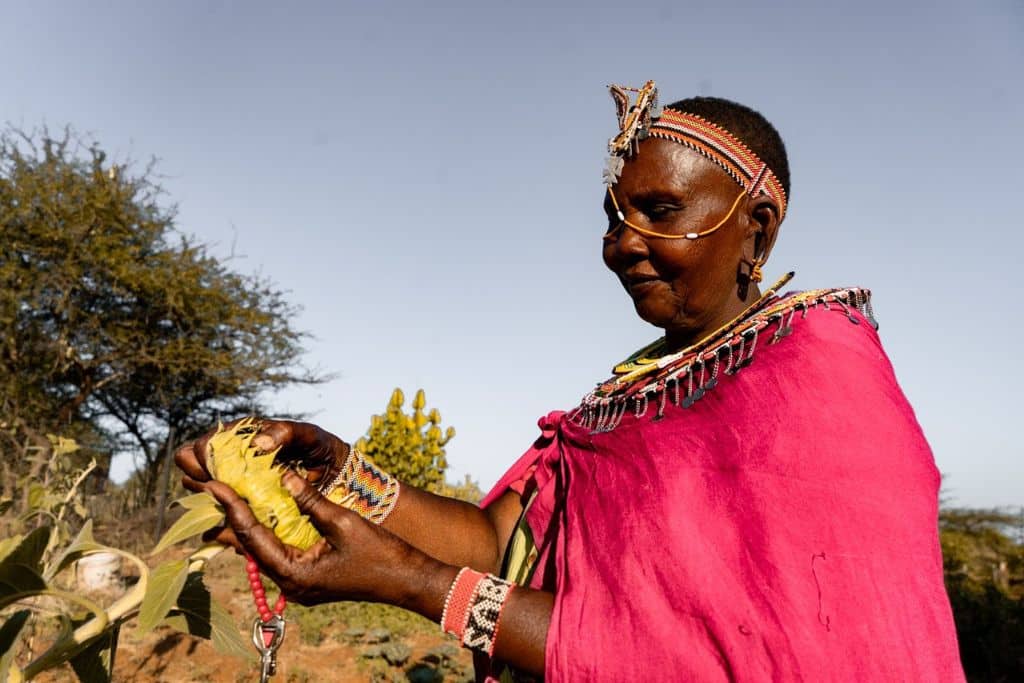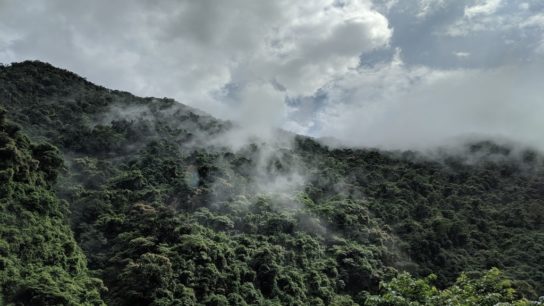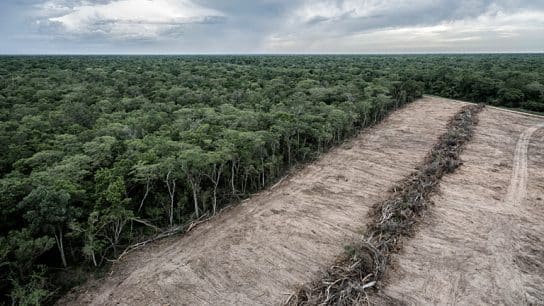The Chui Mamas are on a mission to empower women to attain the highest possible standards of living through income-generating activities.
—
By Andi Cross
We drove for hours, navigating the dusty roads from Meru National Park to the Loisaba Conservancy. With its relentless terrain, we knew the journey would be long, but worth every mile. Upon arrival at Loisaba Tented Camp, we were greeted by Dalmas Malcom Lemaiyan, a Maasai Warrior with a commanding presence and a contagious passion for the wild. Despite our exhaustion and the dust covering our bodies and all that we owned, we could not resist his invitation to immediately begin exploring.
With Dalmas leading the way, the wilderness opened up before us: lions laying under shady trees, elephants in the distance, and giraffes crossing our path so frequently we stopped counting. Eventually, we found ourselves saying, “Oh, just another zebra.” We quickly found ourselves utterly captivated by the heart of East Africa.Our next stop, however, was not about the wildlife. We were here to meet the women reshaping what community leadership and independence mean in this part of Kenya.
Elewana Collection, Loisaba Conservancy and the San Diego Zoo Wildlife Alliance partner with a self-help group in Laikipia County known as the Chui Mamas, whose mission is to empower women to “attain the highest possible standards of living through income-generating activities.” These tribal women, from the Samburu and Ndorobo ethnic groups of the Maa-speaking culture, had invited us into their world to share the next chapter of women’s rights and equal opportunity in a country far behind.

Together with their collaborators, they have built a community center that now serves as both a hub for their efforts and a symbol of progress. These women were stepping into leadership roles for the first time in their lives. Even the name they chose for their group, “Chui” – Swahili for leopard – speaks volumes. Powerful, bold, strong, and unrelenting in their mission, like the leopard on the hunt for prey, these women have committed the rest of their lives to protect their heritage while embracing modern freedoms.
While Kenya’s beauty is undeniable, many communities face significant challenges here. Practices like female genital mutilation persist despite growing opposition. Educational access for girls remains limited. Economic barriers often tether women to outdated systems, despite progress consistent elsewhere in the world. However, the Chui Mamas are rewriting the script, creating opportunities for women and girls to rise above these deeply rooted obstacles for the first time.

At their community center, we were greeted by three members – just a few among the more than 60 women involved in the collective. Wearing intricate, hand-beaded necklaces that displayed their artistry and cultural pride, their energy was magnetic. Communication bridged through their laughter and expressive gestures as well as translation revealed the incredible depth of both their journeys and resilience.
These women’s mission is to use their skills to build a better life. Beadwork, soap making, tailoring, baking, beekeeping, gardening, farming – all serve as income streams and tools for survival, self-sufficiency, and dignity. Their firsthand accounts of hunger, poverty, and drought – conditions worsened by climate change – were sobering. But they wanted us to know that their story was not one of hardship, but rather ingenuity and hope.

To combat both environmental and economic challenges, the Chui Mamas have made regenerative farming a core part of their efforts as well. They walked us through rows of tomatoes, onions, pumpkins, sunflowers, kale, pigeon peas, bananas, cabbages, and fruit trees. Everything is planted and harvested with intention. Crop rotation, water conservation, and companion planting help them stay eco-conscious and productive. Sunflowers serve as natural pest control. Mulching retains moisture in the arid soil. Nothing goes to waste, as compost is made from kitchen and garden scraps to improve soil health and keep their system self-sustaining.
Water scarcity, however, remains one of their biggest threats. Erratic rainfall patterns have made farming a challenge, and one that requires constant adaptation. Covering crops with hay to slow evaporation, implementing compost strategies, and preparing for future rainwater harvesting systems – none of these are high-tech solutions, but they are practical, effective, and built to last. For the Mamas, it is all about climate resilience, established from the ground up.
The community center is where their efforts come together – a collaborative space to gather, work, and dream. With storefronts scheduled to open later this year, each woman will soon have a dedicated place to showcase her craft, earn an income, and take control of her future. In a region where marginalization, cultural taboos, and gender-based violence have long shaped women’s lives, these storefronts represent freedom.

And while tourism brings more people to Laikipia every year, it does not always benefit everyone equally. High-end lodges are present through the area, but the undercurrent of inequity remains strong — and particularly so for women. But this is something the Chui Mamas are determined to change. They are rebuilding the system – creating a new Africa built by those who know that resilience must be rooted in opportunity, not charity. The aim is that, when their storefronts open, they will sell to both their communities and tourists, offering a piece of them to those passing through.
Through these efforts, the Chui Mamas are addressing systemic issues that have long been ignored. Many are single mothers, widows, or women who have been pushed to the edges of society due to circumstances beyond their control – like raising a disabled child. These are women often left without land, livestock, or reliable income. This level of vulnerability affects every part of life – from feeding their children to accessing healthcare or education. But here, they have found community, and just as important, a way forward.

Health challenges like obstetric fistula from unassisted births or eye problems from smokey indoor cooking are common here. The Mamas provide healthcare access, basic needs support, and literacy programs as part of their self-help offering. They are distributing essentials like wheelchairs and roofing materials while creating a universal place for women to receive support, escape abuse, and learn the skills needed to regain their independence.
This movement, the Mamas explained, is not just for today’s generation. They are laying the groundwork to build long-term solutions for those to come. For example, rescue centers for girls escaping early marriage, and programs for children with special needs are top of mind. For these powerful women, it is too easy to just react to the present. They expressed that it is a bigger and more critical challenge to help establish the enabling conditions for a better future on behalf of the next generation.
While Kenya’s natural beauty draws travelers from all over the world – it is not present solely in its wildlife. It is found within its people, too. Conservation goes well beyond protecting wild spaces, and spills into uplifting the communities that live within and alongside them. Because if people are struggling to meet basic needs like food, health, and safety, how can they be expected to care for the natural world?
Laikipia is a proving ground for what social equity and climate resilience can look like when driven from within. The Chui Mamas showed us that refusing to wait for change is the most powerful action a collective can take. They have proven that when women rise, communities stabilize. When tradition meets innovation, progress follows. And when travelers show up with curiosity and care, tourism becomes something far more meaningful than something transactional. It becomes part of the solution.
So if we want to be more than spectators – if we truly want to support a thriving future for places like this – it starts by recognizing that resilience has faces, names, and a shared mission. And that mission is already being put to work.
Featured image: Marla Tomorug.
—
This story is part of an editorial collaboration between Earth.Org and Edges of Earth Expedition, a team dedicated to uncovering powerful stories from the frontlines of the climate crisis. Leading the charge is Andi Cross –an expeditionist, impact strategist, writer, and SSI divemaster –who has spent over two years traveling the world, immersing herself in the realities of environmental change.
This story is funded by readers like you
Our non-profit newsroom provides climate coverage free of charge and advertising. Your one-off or monthly donations play a crucial role in supporting our operations, expanding our reach, and maintaining our editorial independence.
About EO | Mission Statement | Impact & Reach | Write for us








